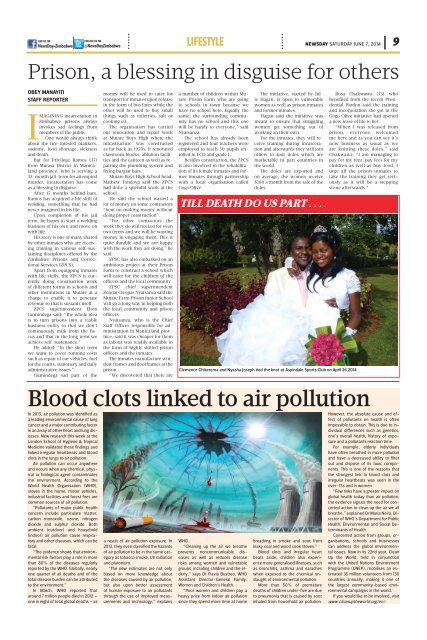Newsday 7 June 2014
Create successful ePaper yourself
Turn your PDF publications into a flip-book with our unique Google optimized e-Paper software.
lifestyle NewsDay saturday june 7, <strong>2014</strong> 9<br />
Prison, a blessing in disguise for others<br />
OBEY MANAYITI<br />
STAFF REPORTER<br />
IMAGINING incarceration in<br />
Zimbabwe prisons always<br />
invokes sad feelings from<br />
members of the public.<br />
One would always think<br />
about the lice-infested blankets,<br />
sodomy, food shortage, sickness<br />
and death.<br />
But for Privilege Ramos (37)<br />
from Mutasa District in Manicaland<br />
province, who is serving a<br />
32-month jail-term for attempted<br />
murder, incarceration has come<br />
as a blessing in disguise.<br />
After 17 months behind bars,<br />
Ramos has acquired a life skill of<br />
welding, something that he had<br />
never imagined in his life.<br />
Upon completion of his jail<br />
term, he hopes to start a welding<br />
business of his own and move on<br />
with life.<br />
His story is one of many shared<br />
by other inmates who are receiving<br />
training in various self-sustaining<br />
disciplines offered by the<br />
Zimbabwe Prisons and Correctional<br />
Services (ZPCS).<br />
Apart from equipping inmates<br />
with life skills, the ZPCS is currently<br />
doing construction work<br />
of different forms in schools and<br />
other institutions in Mutare at a<br />
charge to enable it to generate<br />
revenue so that it sustains itself.<br />
ZPCS superintendent Elton<br />
Gumindega said: “The whole idea<br />
is to turn prisons into a viable<br />
business entity so that we don’t<br />
continuously milk from the fiscus<br />
and that in the long term we<br />
achieve self-sustenance.”<br />
He added: “In the short term<br />
we want to cover running costs<br />
such as repair of our vehicles, fuel<br />
for the courts, stationery and daily<br />
administrative issues.”<br />
Gumindega sad part of the<br />
money will be used to cater for<br />
transport for inmates upon release<br />
in the form of bus fares while the<br />
other will be used to buy small<br />
things such as toiletries, salt or<br />
cooking oil.<br />
The organisation has carried<br />
out renovation and repair work<br />
at Mutare Boys High where the<br />
infrastructure was constructed<br />
as far back as 1950s. It renovated<br />
classroom blocks, ablution facilities<br />
and the canteen as well as repairing<br />
the plumbing system and<br />
fixing burglar bars.<br />
Mutare Boys High School head,<br />
Mathew Tondoya said the ZPCS<br />
had done a splendid work at the<br />
school.<br />
He said the school wasted a<br />
lot of money on some contractors<br />
“bent on making money without<br />
doing proper construction”.<br />
“For other contractors the<br />
work they do will not last for even<br />
two terms and we will be wasting<br />
money in engaging them. This is<br />
quite durable and we are happy<br />
with the work they are doing,” he<br />
said.<br />
ZPSC has also embarked on an<br />
ambitious project at their Prison<br />
Farm to construct a school which<br />
will cater for the children of the<br />
officers and the local community.<br />
ZPSC chief superintendent<br />
Zondai Cleopas Nyatsanza said the<br />
Mutare Farm Prison Junior School<br />
will go a long way in helping both<br />
the local community and prison<br />
officers.<br />
Nyatsanza, who is the Chief<br />
Staff Officer responsible for administration<br />
in Manicaland province,<br />
said it was cheaper for them<br />
as labour was readily available in<br />
the form of highly skilled prison<br />
officers and the inmates.<br />
The inmates manufacture window<br />
frames and doorframes at the<br />
prison.<br />
“We discovered that there are<br />
a number of children within Mutare<br />
Prison Farm who are going<br />
to schools in town because we<br />
have no school here. Equally the<br />
same, the surrounding community<br />
has no school and this one<br />
will be handy to everyone,” said<br />
Nyatsanza.<br />
The school has already been<br />
registered and four teachers were<br />
employed to teach 50 pupils enrolled<br />
in ECD and grade 1.<br />
Besides construction, the ZPCS<br />
is also involved in the rehabilitation<br />
of its female inmates and former<br />
inmates through partnership<br />
with a local organisation called<br />
Gogo Olive.<br />
The initiative, started by Julie<br />
Hagan, is open to vulnerable<br />
women as well as prison inmates<br />
and former inmates.<br />
Hagan said the initiative was<br />
meant to ensure that struggling<br />
women get something out of<br />
working on their own.<br />
For the inmates, they will receive<br />
training during incarceration<br />
and afterwards they will join<br />
others to knit doles which are<br />
marketable in part countries in<br />
the world.<br />
The doles are exported and<br />
on average, the women receive<br />
$180 a month from the sale of the<br />
doles.<br />
TILL DEATH DO US PART . . .<br />
Clemence Chikerema and Nyasha Joseph tied the knot at Aspindale Sports Club on April 26 <strong>2014</strong><br />
Rosa Chakwawa (35) who<br />
benefited from the recent Presidential<br />
Pardon said the training<br />
and incorporation she got in the<br />
Gogo Olive initiative had opened<br />
a new lease of life to her.<br />
“When I was released from<br />
prison, everyone welcomed<br />
me here and as you can see it’s<br />
now business as usual as we<br />
are knitting these doles,” said<br />
Chakwawa. “I am managing to<br />
pay for my rent, pay fees for my<br />
children as well as buy food. I<br />
urge all the prison inmates to<br />
take the training they get seriously<br />
as it will be a stepping<br />
stone afterwards.”<br />
Blood clots linked to air pollution<br />
In 2013, air pollution was identified as<br />
a leading environmental cause of lung<br />
cancer and a major contributing factor<br />
in an array of other heart and lung diseases.<br />
New research this week at the<br />
London School of Hygiene & Tropical<br />
Medicine validated these findings and<br />
linked irregular heartbeats and blood<br />
clots in the lungs to air pollution.<br />
Air pollution can occur anywhere<br />
and occurs when any chemical, physical<br />
or biological agent contaminates<br />
the environment. According to the<br />
World Health Organisation (WHO),<br />
stoves in the home, motor vehicles,<br />
industrial facilities and forest fires are<br />
common sources of air pollution.<br />
“Pollutants of major public health<br />
concern include particulate matter,<br />
carbon monoxide, ozone, nitrogen<br />
dioxide and sulphur dioxide. Both<br />
ambient (outdoor) and household<br />
(indoor) air pollution cause respiratory<br />
and other diseases, which can be<br />
fatal.<br />
“The evidence shows that environmental<br />
risk factors play a role in more<br />
than 80% of the diseases regularly<br />
reported by the WHO. Globally, nearly<br />
one quarter of all deaths and of the<br />
total disease burden can be attributed<br />
to the environment.”<br />
In March, WHO reported that<br />
around 7 million people died in 2012 -<br />
one in eight of total global deaths – as<br />
a result of air pollution exposure. In<br />
2013, they even classified the hazards<br />
of air pollution to be in the same category<br />
as tobacco smoke, UV radiation<br />
and plutonium.<br />
“The new estimates are not only<br />
based on more knowledge about<br />
the diseases caused by air pollution,<br />
but also upon better assessment<br />
of human exposure to air pollutants<br />
through the use of improved measurements<br />
and technology,” explains<br />
WHO.<br />
“Cleaning up the air we breathe<br />
prevents noncommunicable diseases<br />
as well as reduces disease<br />
risks among women and vulnerable<br />
groups, including children and the elderly,”<br />
says Dr Flavia Bustreo, WHO<br />
Assistant Director-General Family,<br />
Women and Children’s Health.<br />
“Poor women and children pay a<br />
heavy price from indoor air pollution<br />
since they spend more time at home<br />
breathing in smoke and soot from<br />
leaky coal and wood cook stoves.”<br />
Blood clots and irregular heart<br />
beats aside, children also experience<br />
more generalised illnesses, such<br />
as bronchitis, asthma and earaches<br />
when exposed to the chemical onslaught<br />
of environmental pollution.<br />
More than 50% of premature<br />
deaths of children under-five are due<br />
to pneumonia that is caused by soot<br />
inhaled from household air pollution.<br />
However, the absolute cause and effect<br />
of pollutants on health is often<br />
impossible to obtain. This is due to individual<br />
differences such as genetics,<br />
one’s overall health, history of exposure<br />
and a pollutants reaction time.<br />
For example, elderly individuals<br />
have often breathed in more pollution<br />
and have a decreased ability to filter<br />
out and dispose of its toxic components.<br />
This is one of the reasons that<br />
the strongest link to blood clots and<br />
irregular heartbeats was seen in the<br />
over-75s and in women.<br />
“Few risks have a greater impact on<br />
global health today than air pollution;<br />
the evidence signals the need for concerted<br />
action to clean up the air we all<br />
breathe,” explained Dr Maria Neira, Director<br />
of WHO’s Department for Public<br />
Health, Environmental and Social Determinants<br />
of Health.<br />
Concerted action from groups, organisations,<br />
schools and businesses<br />
can address the global environmental<br />
issues. Now in its 22nd year, Clean<br />
Up the World, held in conjunction<br />
with the United Nations Environment<br />
Programme (UNEP), mobilises an estimated<br />
35 million volunteers from 130<br />
countries annually, making it one of<br />
the largest community-based environmental<br />
campaigns in the world.<br />
If you would like to be involved, visit<br />
www.cleanuptheworld.org/en/


















